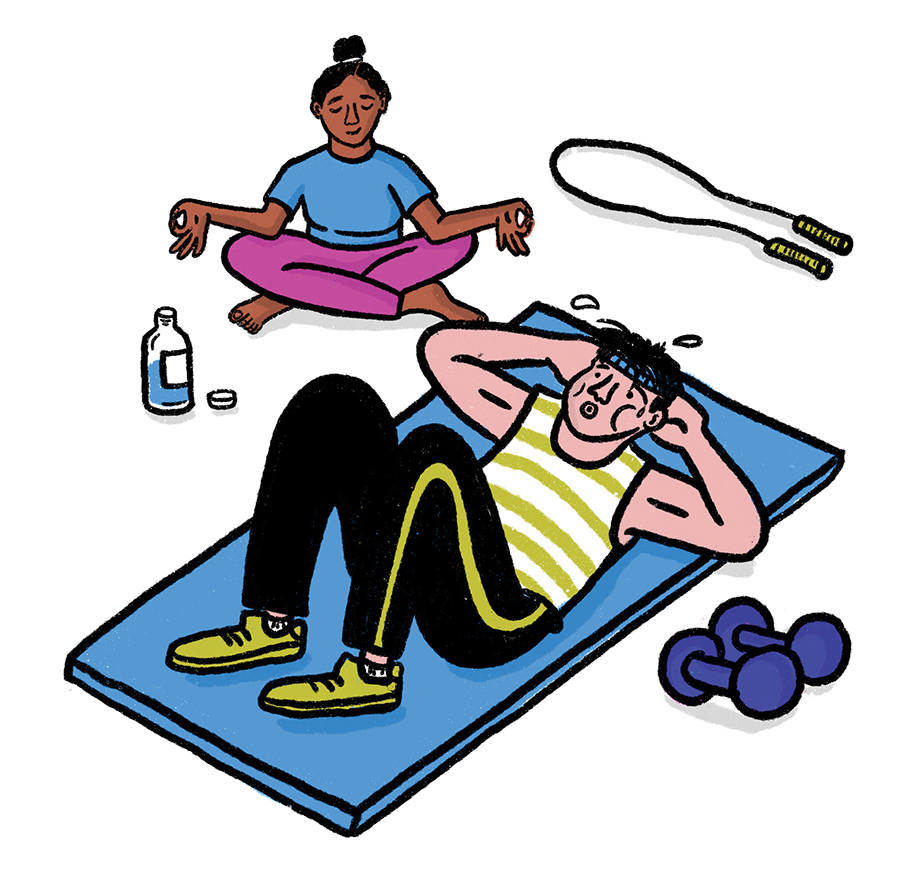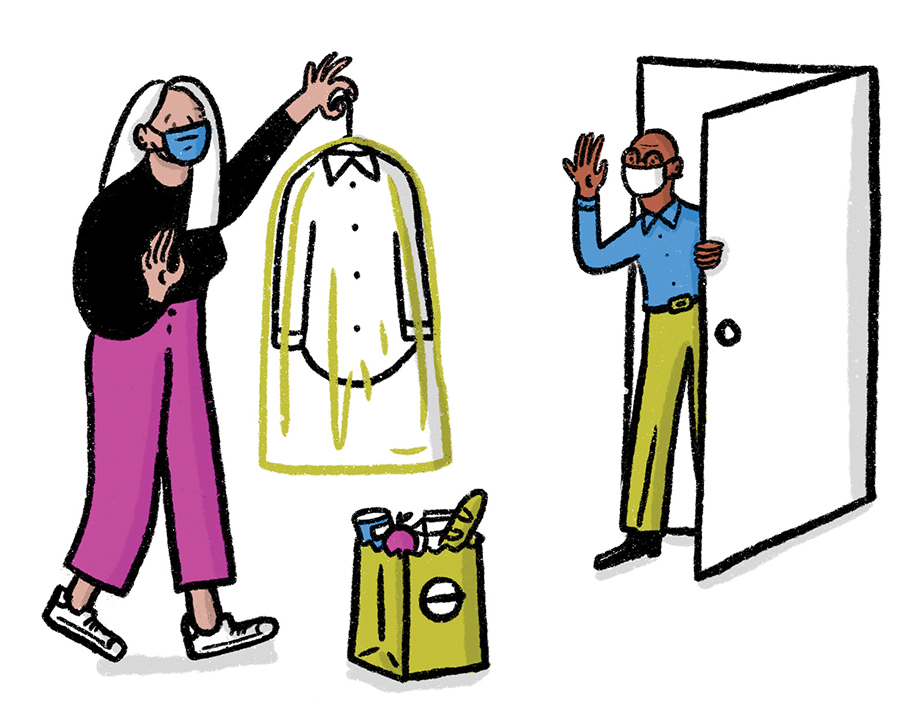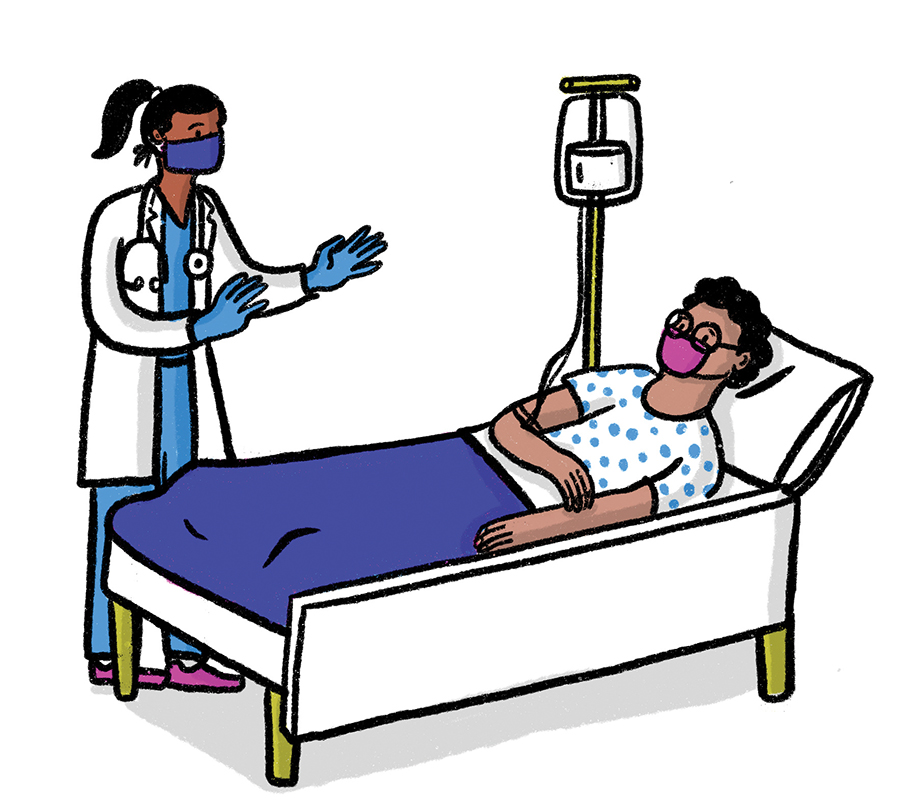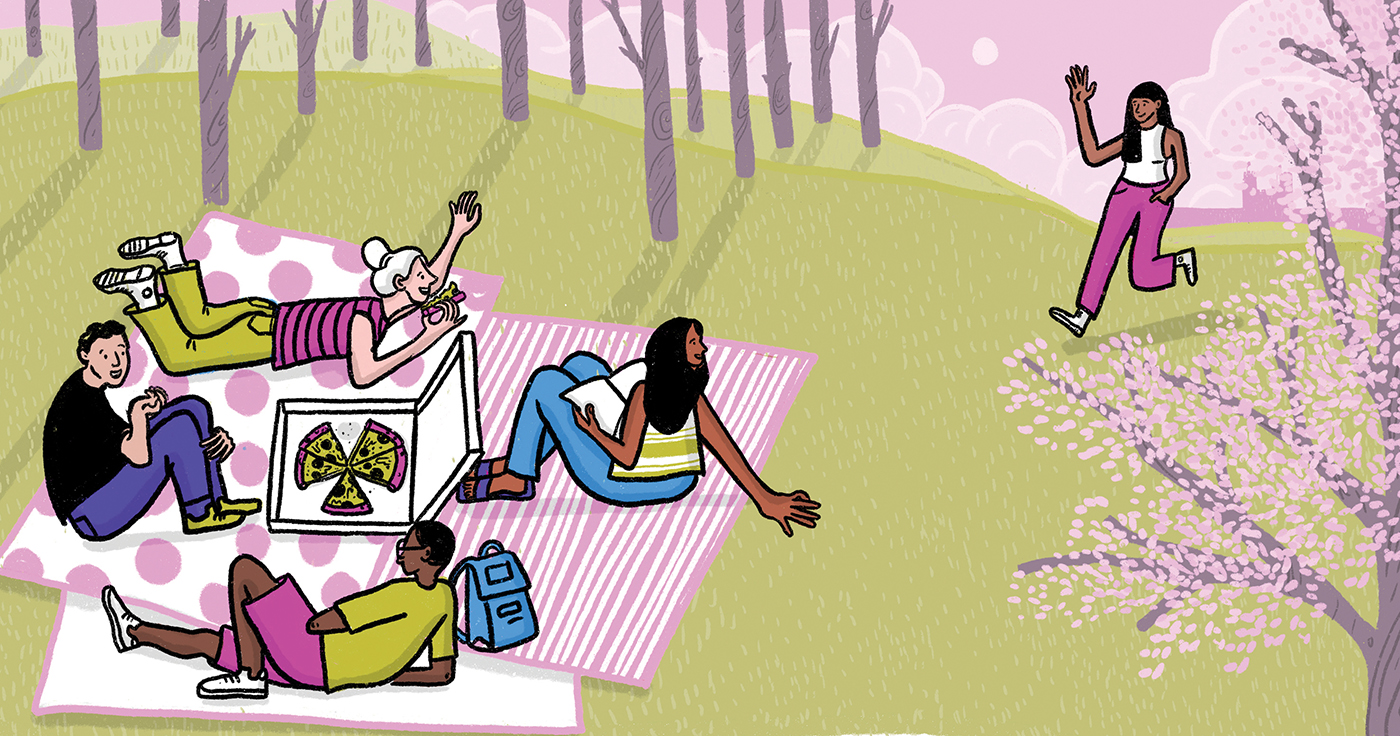How to calm difficult emotions. Stay motivated. Fight Zoom fatigue. Stay safe. Breathe away panic. Teach - and learn - remotely. Be there for a friend who is quarantining. Balance home and work-from-home. Manage the tech. Take yoga online. Continue with professional development. Combat loneliness. Manage uncertainty. Remain tolerant. Stay mindful. Stay purposeful.
There was a lot to learn last spring, and in response, Washington University swiftly developed new tools, a "parallel curriculum." Sometimes practical, sometimes existential, it offered resources for students, faculty, staff, anyone who needed help coping with the pandemic and the ensuing changes.
Sometimes the answer was to acquire more knowledge. When Krista Millich, a biological anthropologist, developed an online course titled "The Pandemic: Science and Society," more than 1,200 students registered - the highest enrollment of any class ever taught at WashU.
At other times, the point was to feel. In April, the Center for the Humanities launched a poetry project, LIFE/LINES, offering daily prompts to hundreds of people on and off campus. Posted online, the 1,200 heartfelt poems stitched an impromptu community.
In student affairs, Rob Wild, then-interim vice chancellor, urged his team to get creative. "Last fall, we gave students the choice to be here or to study remotely, and we were upfront that it would not be a normal semester," he notes. Despite their private worries, staff found countless ways to make student life in a pandemic both engaging and safe. The rec center opened by appointment. There were numerous virtual programs, such as the career center offering live chats with students to help them explore possibilities. Thanksgiving meant care packages for the students staying on campus and stations where they could send postcards home to their families.
For students whose home life might not be ideal for learning, Wild knew it was calmer to be on campus. Others were "just happy to be here," he noticed. "The late-night conversations in the residence halls, the big activities, aren't happening, yet students are still seeking opportunities to make friends and be part of the community. It's been inspiring, actually."
For the extroverted, now much-more-isolated student affairs staff, Wild co-hosted Zoom town halls with no agenda except to discuss the questions people submitted anonymously in advance. Between 80 and 100 employees - those missing the burst of energy they used to get from the big monthly student affairs meeting - attended every week. Care packages of hot cocoa and popcorn were sent home, so at least they could stay cozy and know they were remembered. And the Division of Student Affairs wasn't alone; other departments across the university whose employees continued to work from home provided similar feel-good exchanges to keep colleagues connected, and upbeat.
Some of the biggest challenges were related to quarantine, for students who had been exposed to COVID, and isolation, for students who tested positive. It's tough to keep a young adult alone in a small room, not even walking outside, for 14 days. Some students complained, a few loudly. But staff bent over backward for them, trying to vary their meals, stay in daily contact.
"Over Thanksgiving weekend, staff came to campus to hand out hot chocolate and a cookbook of students' favorite recipes," Wild says. When it turned cold and the heating hadn't yet kicked on, Cheri LeBlanc, MD, executive director of the Habif Health and Wellness Center, brought in her own space heater for a young woman who was chilly.
"In some ways, we were worried more about students' mental health than their physical health, because for this age group, generally, COVID was not going to cause the things we were all scared about."
Cheri LeBlanc, MD
"In some ways, we were worried more about students' mental health than their physical health," LeBlanc says, "because for this age group, generally, COVID was not going to cause the things we were all scared about."
Nearly all the students rallied during quarantine and isolation, she says, and willingly followed the protocols. Other universities had trouble with students flouting the rules, "but we did not have that at all."
If students in quarantine or isolation needed to talk anything through, there was a 24/7 phone line, plus online groups and activities. LeBlanc worked closely with a few students who needed to go home to quarantine. "Their anxiety didn't stem from fear of the disease necessarily," she says, "but from the isolation, and the thought of not being able to leave a small space." Still, most students weathered the constraints well - even though two weeks feels like forever when you have lived only 18 years, and solitude feels like torture.
"I've been incredibly impressed," LeBlanc says. "They are doing the right things, wearing their masks even outdoors. It makes us all the more eager to do whatever we can to support them."
Messages went out on the Habif Health and Wellness Center's Instagram page, offering simple ways to stay grounded, calm, mindful. Other coping messages focused on staying connected, keeping a schedule, staying productive and dealing with uncertainty (you control what you can control, including your sleep, exercise and the amount of news streaming at you).
Often people in the university community needed ways to find meaning in the chaos, to energize themselves with new purpose when their normal routine had ground to a halt. Or they needed basic public health information, practical ways to avoid contagion, tips on working or studying from home. Sometimes people just needed to connect, distract themselves for a while, set new limits, pace themselves, volunteer, go for a run, laugh with a friend or sleep.
Human Resources worked to adapt well-being resources to help employees and their families find the support they needed in a changing and uncertain environment. "The well-being of people is always our focus in HR, and during the pandemic, we really came together to provide real-time support for every aspect of employees' lives," says Legail Chandler, vice chancellor for human resources.
In partnership with Bradley Evanoff, MD, MPH, director of the John T. Milliken Department of Medicine Healthy Work Center, HR's employee wellness program helped carry out a survey to gauge well-being throughout the pandemic. The results have helped identify and address the evolving and important needs of the WashU community. Support was rooted in well-being for the whole person, including physical and mental health, family care, flexible and remote work, and professional learning. Services wrapped around every possible need: COVID-19 testing, telehealth and virtual visits, prescription delivery, financial education sessions, special time off, 24/7 work-life support, mindfulness sessions, health coaching, family care resources, professional learning, and a managers' hub to help people lead their teams through new challenges.
"The pandemic highlighted the important need to continue to build a culture of care for our entire community - from health-care workers on the front lines to staff adapting to delivering our missions remotely. With each initiative, our team and university leadership stepped up for the greater good."
Amanda Pope
"The pandemic highlighted the important need to continue to build a culture of care for our entire community - from health-care workers on the front lines to staff adapting to delivering our missions remotely," says Amanda Pope, director of employee engagement and HR communications. "With each initiative, our team and university leadership stepped up for the greater good."
Human Resources collaborated with the Department of Psychiatry, as well as the School of Medicine, Student Affairs, Brown School and other leaders to ensure access to mental and emotional wellness resources and services.
WashU already had a wellness consultant, Meg Krejci, who teaches the community about mindfulness and stress reduction. This year, she found herself teaching six or seven classes a day. Everybody was stressed, and they knew it, and there was no shame in it. She created special sessions just for physicians, just for residents or postdocs, just for parents. Worry, fatigue, emotional eating, insomnia - "people weren't even aware how their bodies were responding," she says, "because they were in warrior mode, thinking their way through the crisis. And then they'd get swept away by uncertainty and fear and grief."
Krejci showed people not how to shut their minds off, but how to slow their thoughts, put some space between them: "In that space, the body will restore itself." Once people paid attention, triggers to panic or angst lost some of their power, and it became possible to choose how to respond.
It wasn't easy. "You are unraveling habitual thinking patterns and behavioral responses," Krejci says, in an environment so geared to service that people forget to care for themselves. She felt like she was putting her arms around the university, teaching remote sessions such as "The Power of Hope in Uncertain Times," "Cultivating Peace" and "Resiliency and -Well-Being."
"Some folks were at home not knowing what to do. Some were furloughed. Some were working around the clock. Some were trying to work with children underfoot. And then there was the stress around the difficult issues our country was facing related to racial inequity and the election; it was unrelenting," she says. In response, she developed new sessions: "Uncovering Implicit Biases" and "Staying in Difficult Conversations" - without your body tensing.
"When we become stressed, we are swept away, disconnected. We lose ourselves. And mindfulness brings us back," Krejci promised her students, some of whom were the university's top physicians or administrators.

University support was rooted in well-being for the whole person, including physical and mental health, family care, flexible and remote work, and professional learning. (Illustration: Vidhya Nagarajan, BFA '10) 
We know about post-traumatic stress, but there is newer research on post-traumatic growth. Both individuals and communities can grow stronger in times of adversity. (Illustration: Vidhya Nagarajan, BFA '10) 
"If anything good can come from a miserable pandemic, it's that people realize that health-care workers are human and feelings are okay," Jesse Gold, MD, MS, says. "And the emotional side is just as important as the physical exhaustion, and we have to figure out how to manage that." (Illustration: Vidhya Nagarajan, BFA '10)
Jessi Gold, MD, MS, assistant professor and director of wellness, engagement and outreach in the Department of Psychiatry at the School of Medicine, focused her efforts on front-line health-care workers, who were seeing far more death than ever before. "With COVID," she says, "people crash faster, they stay in the ICU longer, and they die more often."
Gold and her colleagues volunteered to staff a mental health hotline, partnering with people across the university - in Human Resources, religious and spiritual life, social work - who were concerned about faculty and staff wellness. Administrators ripped away barriers and expanded services. The Employee Assistance Program after-hours hotline was opened to BJC HealthCare and WashU employees.
"Mindfulness, weighted blankets - you have to try things until you find out what works for you. And you can't assume what has worked in the past will work in a pandemic. The structure of life right now is very different."
Jesse Gold, MD, MS
In-the-moment coping skills were taught in enough variety that anyone could find a comfortable fit. "Mindfulness, weighted blankets - you have to try things until you find out what works for you," Gold explains. "And you can't assume what has worked in the past will work in a pandemic. The structure of life right now is very different."
She visited other departments to talk about mental health. Free drop-in groups were set up to focus on reducing anxiety, a key need since a study found that 18% of medical trainees at Barnes-Jewish Hospital were living with significant anxiety. The psychiatry department hired two therapists dedicated to faculty and staff, and expedited appointments for them. Services have been done almost exclusively by telehealth, which has been a preferred method for many faculty due to the ease of opening up a computer to hold an appointment.
So much was new and terrifying, including the threat of contagion and the fear of running out of PPE supplies, beds and ventilators, Gold points out. "In the U.S., we often think, 'Do we need all this?' as opposed to, 'We have only one of these. Whom do we give it to?' Most of us didn't train in a system of scarcity. So you have a lot of anticipatory anxiety about what's coming and whether you'll have enough."
Last spring, when those worries began, they were mixed with hope: "With people staying home and social distancing, there was more of a feeling that the rates would go down and we would get hold of this thing." When rates surged again in the fall, Gold says, "there was more hopelessness." Vaccine approvals brightened the horizon, "but we are realistic about rolling that out over a big population over several months when people's behavior hasn't changed. It's been hard to be in that culture."
It's also hard to admit how hard it is. "We do a lot of hiding in medicine," Gold says. "You're supposed to take care of other people, and your feelings aren't supposed to interfere. So you're pretty stoic - and you don't have a problem until you have a big problem." What helped most, she found, was old-fashioned listening. "A lot of the problems in the world right now cannot be drugged out of you. I've been doing a lot more supportive therapy than I usually do."
More will be needed, she warns. Once the adrenaline can subside, "the mental health system is going to be dramatically overrun." It's the post-storm effect: "You get out and assess the damage, and then you assess your internal damage, because you can finally do that." Symptoms might take two to three years to show up. Meanwhile, people with pre-existing conditions that had been stable and well-managed for years saw them fly out of control.
At the very beginning, Gold and her colleagues saw "a lot of anxiety." Over time, she saw more depression. "People were OK at the beginning, but the longer this has gone on, the more it has effected mood. It's so prolonged and indefinite."
Grief has yet to be fully addressed, she points out. People have lost loved ones and been unable to mourn them in the usual ways. Health-care workers have watched people die and had to press on, caring for the next patient and the next. The entire nation has watched the death count soar, the numbers so abstract that we grew numb to them, with many accepting the toll as inevitable.
"A lot of things people have experienced - especially people who aren't like me and haven't gone to therapy every week to talk about it - will need to be understood," Gold says. "Just to be able to say, 'I was a health-care worker during 2020, and it was very hard for these reasons…' We need to be a little more vulnerable, a little more open." A little less stoic.
"If anything good can come from a miserable pandemic, it's that people realize that health-care workers are human and feelings are okay," Gold continues. "And the emotional side is just as important as the physical exhaustion, and we have to figure out how to manage that."
Mindful of their ongoing stress, WashU colleagues used the toolkits the university provided to send their thanks, hope and concern to those on the front lines. Turned out it was easier to go through a crisis feeling connected and concerned than to sit alone in a room doomscrolling. From this realization, a new idea called The Gratitude Project took shape, a video series highlighting faculty, staff and students working for the greater good.
"One of the most effective ways to take care of ourselves is to take care of other people."
Tim Bono
"One of the most effective ways to take care of ourselves is to take care of other people," notes Tim Bono, a lecturer in psychological and brain sciences, assistant dean in student affairs and the driving force behind The Gratitude Project. He urged students to run errands for elderly neighbors, provide meals for hungry families, share their talents online, or find ways to thank those who were doing all these things.
We know about post-traumatic stress, but there is newer research on post-traumatic growth, Bono notes. Both individuals and communities can grow stronger in times of adversity. He sees the marked increase in warmth, humanity and personal concern across the university: "Managers have been very accommodating, acknowledging the toll this is taking not just on people's professional or student lives but on their personal lives. At the start of meetings, people are really interested: 'Tell me how things are going, how you are taking care of yourself.'"
Priorities have sometimes needed to shift, Bono adds, a recalibration that might be a relief to those who felt pressured by WashU's relentless push for excellence. "It's not just accolades and awards and a long c.v. but the way we are taking care of each other and taking care of our community that matters - our relationships, our ability to contribute to something bigger than ourselves."
Still, Bono concurs that anxiety has plagued most everyone, whether they were already vulnerable to it or not.
"I certainly had my share of anxious times. Part of what has made this pandemic so challenging is that it feels like so much is spinning out of control, and that's the hallmark characteristic of anxiety, the sense that the future is difficult and challenging and out of your control. It becomes important to redirect attention to things that are in our control."
Tim Bono
"I certainly had my share of anxious times," Bono says. "Part of what has made this pandemic so challenging is that it feels like so much is spinning out of control, and that's the hallmark characteristic of anxiety, the sense that the future is difficult and challenging and out of your control. It becomes important to redirect attention to things that are in our control."
To keep students motivated, he urged them to find things that would give them a sense of accomplishment and gratification, a sense that they were effective and creative and could accomplish goals. Even small accomplishments, early in the day, would provide a burst of energy and well-being, making it possible to tackle larger challenges as the day went on.
Bono warned his students about social media, "which is specifically designed to keep you coming back." One more scroll, and who knows? Instead of more doom, you might find a cat playing the piano. The algorithms work the way slot machines work in Las Vegas. "People don't get addicted to vending machines," he points out. "It's the uncertainty, not knowing what will happen when you feed money in" - or scroll or click.
Plenty of students heard his advice; his classes had near-perfect attendance in the fall. Again and again, he watched students find creative ways to make the most of any opportunity, even in a pandemic. "I'm not surprised," he says, "and it was wonderful to see that spirit emerge even in really dark, trying times."
Everyone was adjusting, but Bono sorely missed the casual encounters, spontaneous and unscheduled, when he'd bump into someone on campus and have a conversation or stop to listen to a group of students playing music. The upside of such deprivations, he says, is a concept called "mental subtraction": You become even more grateful for something when it's taken away.
All the rituals will return, he reminded himself and his students. Graham Chapel will again have standing-room-only audiences. The campus will again be crisscrossed with laughing, waving humans who can throw their arms around a friend's shoulder or lean close to confide a secret.
In the immediate future, though, coping will mean redoubled caution, as life begins to normalize but is not yet entirely safe. Context often dictates behavior and emotion, Bono says, and it will be all too easy to slip into old ways of behaving when things begin to feel familiar again.
Caution will have to be maintained, and the experiences people have endured will have to be talked through, made meaningful and stored as a source of strength for the future.
After coping with COVID, a lot of once-daunting challenges are going to look like a piece of cake.







